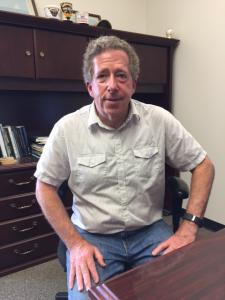Doug Lipton

Voices from the Science Centers
Voices from the Science Centers is an oral history initiative dedicated to documenting the institutional knowledge of fisheries scientists and administrators in the labs of NOAA’s Fisheries Science Centers.
Dr. Doug Lipton is currently the Senior Research Economist at NOAA Fisheries and a member of the Council of NOAA Fellows. He has a Bachelor’s in Biology from Stony Brook University, a Master’s in Marine Science from the College of William and Mary, and a PhD in Agriculture and Resource Economics from the University of Maryland. He started with the National Marine Fisheries Service as a Sea Grant Fellow in 1979 and was hired by NMFS as a fishery biologist before returning to school for economics. He also worked for Sea Grant as the national economics coordinator.
Interview contains discussions of: fisheries economics, resource economics, NOAA, NMFS [National Marine Fisheries Service], marine science, human dimensions, Sea Grant Fellowship, Magnuson-Stevens Act, ecosystem-based fisheries management, Cooperative Institutes, ICES [International Council for the Exploration of the Sea], modeling, big data, surveys, watershed.
In this interview, Doug Lipton discusses his current role as senior scientist for economics in promoting the inclusion of high-level economics in NOAA. He describes the history and growth of economics in NOAA during his time with the agency, from one or two economists in each center to 100 economics and human dimensions employees across the country, and modern interdisciplinary research on how to manage fisheries through an economic lens.
Lipton details his work on projects to incorporate economics into ecosystems-based fisheries management, and also spends time discussing the important role of Cooperative Institutes, coalitions of universities that can easily collaborate with NOAA. He hopes to establish a Cooperative Institute specifically for economics. He describes similarities and differences between working in government and working in academia, since he has experiences both worlds, as well as the history of Sea Grant and his extensive involvement with the program throughout the years, from being one of the first Sea Grant Fellows to becoming the national Sea Grant economics coordinator.
Lipton analyses the impact of more detailed and extensive data on economics research in developing accurate models for decision-making, and the difficult and time consuming process of developing surveys for sampling and low survey response rate. He is most proud of his work building a watershed and water quality program and creating new positions to deal with watershed problems. To people coming into NOAA, he advises that one must not only be self-motivated, but also be able to choose the things that are most important to work on and do one’s
Please Note: The oral histories in this collection are protected by copyright and have been created for educational, research and personal use as described by the Fair Use Doctrine in the U.S. Copyright law. Please reach out Voices@noaa.gov to let us know how these interviews are being used in your research, project, exhibit, etc. The Voices staff can help provide other useful resources related to your inquiry.
The NOAA mission is to understand and predict changes in climate, weather, oceans, and coasts, to share that knowledge and information with others, and to conserve and manage coastal and marine ecosystems and resources. The Voices Oral History Archives offers public access to a wide range of accounts, including historical materials that are products of their particular times, and may contain offensive language or negative stereotypes.
Voices Oral History Archives does not verify the accuracy of materials submitted to us. The opinions expressed in the interviews are those of the interviewee only. The interviews here have been made available to the public only after the interviewer has confirmed that they have obtained consent.
